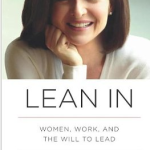 I’m reading Sheryl Sandberg’s book, Lean In, just now, and I’m finding it a fascinating, thought-provoking read.
I’m reading Sheryl Sandberg’s book, Lean In, just now, and I’m finding it a fascinating, thought-provoking read.
Sandberg is on a mission to encourage women to step up, and to step in to leadership roles. She’s clear that one of the main obstacles to women achieving this is self-doubt. We are bombarded by messages concerning all the things it’s wrong for us to be, like: more powerful than men, assertive, or high earners. As women we are extremely good at taking these messages on board and feeling ‘not good enough’.
She also cites research to demonstrate that, while men are promoted on potential, women are promoted based on past accomplishments. Talk about chicken and egg! It’s not surprising that so many women complain they can’t get promoted because they lack the relevant experience.
Wearing my HR consultant’s hat, I’ve been involved in a number of organisations that claim to promote, develop, assess and recruit staff on a competence (or competency) basis. I’ve even designed competence frameworks – the collection of attributes and behaviours against which staff at different levels in an organisation are assessed. Competence frameworks are supposed to reduce bias and encourage fairer management practices.
In theory, at least, a good competence framework does encourage promotion on the basis of potential. ‘Good’ competence frameworks also have a lot to say about attitudes and behaviours: ‘adopts a positive attitude’, ‘is flexible in the face of change’, challenges poor practice’, and so on.
After reading ‘Lean In’, I find myself reflecting on the following. Designers of competence frameworks look for examples of excellence within the client organisation so they can build the attitudes and behaviours of these excellent performers into the framework as a model for everyone to aspire to. At the more junior levels, there are as many effective women as there are effective men, so competence models for the lower levels are likely to reflect both male and female behaviours. The higher you go in an organisation, the quicker the number of ‘effective’ women dwindles. As a result, the ‘effective’ behaviours that a framework designer will be modelling at the top of the organisation are predominantly male behaviours.
In our attempts to develop approaches to recruitment and development that are fair, we are actually shooting ourselves in the foot by creating models of behaviour and excellence that are based on, and so favour, male behaviours and attitudes. Ouch!
So What Tips Does ‘Lean In’ Offer?
If you’re still reading, you’re probably wondering what all this has to do with you, or more importantly what you can do about it. Here are the top 9 tips that I have gleaned so far.
1. Read ‘Lean In’. Yes, Sandberg is an exceptionally intelligent, high flying woman. At the same time, she came from an ordinary background, and an under performing high school. She talks honestly about the challenges of feeling a fraud, being given less leeway than her male colleagues, giving herself less leeway than she gives her male colleagues, and balancing career and motherhood.
2. Support other women. She highlights the importance of women supporting women, rather than criticising each other for daring to do something different or deviating from social norms. It’s sad to see that many women seem frightened of the consequences for their own careers if they are seen to support other women.
3. Figure out what’s right for YOU and live your life accordingly. Not everyone wants a leadership role, but if deep inside t it’s what you crave, go for it. Similarly if you find real happiness in having babies and focussing on looking after them, then do it.
4. Fake it till you make it! Given that many worn are prey to self-doubt, there are times when you have to hold your head up high and act as if you truly believe you are the bet person for the job.
5. Put yourself forward for opportunities.
6. Embrace risk and uncertainty.
7. Find a mentor – but make it reciprocal, so that you give your mentor as much as she/he gives you
8. Make your partner a real partner (there’s a whole chapter on this one!)
9. Set your own goals and go for them with gusto (whether they are concerned with being the CEO of a global organisation, a great teacher or carer, the mother of a happy family, a world-class traveller. Just dream big and go for it).
Have you liked The Career Success Doctor’s Facebook Page yet? There’s a free report you can download that is only available from the facebook page.
